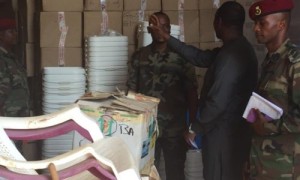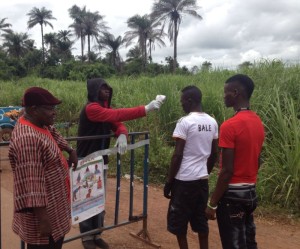By Alhaji Dr. Kandeh Kolleh Yumkella
The devastating effects of the coronavirus disease (COVID-19) continue around the world. As China begins its recovery process, the disease has deeply penetrated Europe and North America. By all indications, Europe is now the epicentre with Italy being the hardest hit country and others like Germany, Spain among others reporting a steep rise in infections.
As of Sunday, 22 March 2020, Italy had more deaths from COVID-19, than the number of deaths from Ebola in Sierra Leone over three years. CNN reported about 26,000 cases in the US and globally exceeded 300, 000. Africa has not been spared either.
I sympathize and express solidarity with Sierra Leoneans in the diaspora who live in countries and cities with high incidence of COVID-19 infections; we pray for their families and all citizens of those countries and remained hopeful that the Almighty God will wipe away this calamity for all humanity.
In his column in the New York Times titled “Our New Historical Divide: B.C. and A.C. – the World before Corona and the World After,” Thomas L. Friedman, explained the exponential rate of growth of COVID-19. He quoted Bill Joy (co-founder of Sun Microsystems) who noted that “The virus is like a loan shark who charges 25 percent a day interest. We borrowed $1 (the first coronavirus to appear here). We then fiddled for 40 days. Now we owe $7,500. If we wait three more weeks to pay, we’ll owe almost $1 million.”
If there is such a rate of spread in the more advanced countries, imagine what could happen in countries such as ours. It is prudent, therefore, that we do all we can to prevent the very first infection here at home. As deaths ballooned in Europe, we all know now the risks and dangers are very real. Hence the reason we have held two days of a special session of our Parliament to determine how we can support the measures taken so far by Governments.
I thank the Ministers and Government officers who spent valuable time with us and listened to our queries and suggestions. The discussions, indeed, were nonpartisan and focused on the safety, health and well-being of our people. I provide below my take on our deliberations, starting with my visit to the main testing and treatment center for epidemics, including coronavirus, in Sierra Leone i.e. the 34-Military Hospital.
I decided to stop by the 34 -Military Hospital (34-MH) to ask for a coronavirus test. I also wanted to experience first-hand what a citizen will go through if he/she required a test. Will the system work? I was pleasantly surprised by the vigilance and preparedness of the military personnel.
From the gate, I was asked to wash my hands; I was properly directed to the new infectious disease cum biosecurity center which was established through the generous donation of the Peoples Republic of China. I was quickly ushered in to meet Colonel Sevalie, one of the senior ISAT commanders.
Colonel Sevalie and his team followed international triage protocols to interview me. They asked me why did I want to be tested? What were my symptoms? They also asked whether I was in a country or city with a significant incidence of COVID-19. Given my responses, they decided that I did not need the test because there were no symptoms and I was not from a high-risk country.
They also explained that with the limited amount of test kits and cost of reagents, they will reserve the tests for real COVID-19 cases and cannot afford to test every flu case. When I mentioned that I was on my way to Parliament for a debate on the COVID-19, they offered to show me their infrastructure and answered my many inquisitive questions. A summary of what I saw and heard is given below:
- There are 370 test kits available in the whole country and 150 are at 34-MH. Of the 150 test kits available at this RSLAF center, 100 are for nucleic acid tests that will take 6-hours and are more definitive, and the remaining 50 are rapid test kits that can be done within 30-minutes. Whether there are test kits available in every district is not known.
- Our Rapidly Deployable Isolation Treatment Facility (RDTIF) consists of 36 beds, 4 ambulances and other equipment (a leftover from the Ebola epidemic). This is the set of equipment the military will quickly deploy along with their well- trained men and women should we have a sudden surge of infections in a region. Unfortunately, they have only one RDTIF, and ideally, they need two to three.
- Reports indicate that there are at least 40 additional ambulances ready.
- The officers also expressed the urgent need for expanding the rapid deployment capacity for ISAT; strengthening the intensive care facility which currently has only two cardiac monitoring equipments which are critical for all serious cases; and scaling up the supply of consumables such as gloves, masks, PPEs.
- The officers lamented that the country does not have enough lab technicians with ability to do sophisticated lab analysis and would like opportunities for advanced training.
- An oxygen making plant will be established in the coming week to ensure continuous availability of supply (a must for COVID-19 patients who require assisted breathing equipment).
Despite the enlightening briefings and debates in Parliament on our readiness as a nation for COVID-19, the truth is there are many unknowns about the viral disease, given its speed of transmission which seems to confound even the best experts around the globe.
- We learnt that there is a critical and urgent need for more test kits. For ease of comparison during the Ebola outbreak, there were 14 testing labs established (only 3 exist ), and 109 thousand tests were done between 2013-2014.
It begs the question, are there mobile test kits available especially at the district level? The Deputy Minister indicated that WHO has committed to fly in additional test kits within 24 hours if the need arises, and they expect additional test Kits from the African Union under the initiative with the founder of Alibaba.
- We have an army of trained contact tracing personnel, and over one hundred staff in the Ministry of Health with basic training in epidemiology and solid experience gained from the Ebola era.
However, if we have a major breakout, we need to quickly mobilize many more. One wonders whether we need to have a regularly trained epidemic reserve team of say 300 volunteers that are regularly trained to be a standby force in this epidemic prone neighbourhood of ours.
- There is only one well-equipped biosecurity facility at 34-MH, built with the support of aid from the People’s Republic of China; which begs the question what happened to the famous Kerry Town? In addition to 34-MH there are two more dedicated testing labs in Kenema hospital and Lakka.
- The Deputy Minister of Health informed us that based on their initial modelling, it would cost Le 63 billion ($6.3 million) to quarantine suspected cases, Le167 billion ($16.7 million) to engage in massive prevention and awareness creation, and Le597 billion ($59.7 million) for treatment. In a cash strapped economy like ours, our best defence are mass awareness raising and prevention.
- The Government has already provided Le2 billion to the Ministry of Health in the past two weeks to support their initial interventions. An integrated plan is being worked on in co-operation with donors, which will require hundreds of billions of Leones. There is goodwill to be shown by the World Bank (potentially $12 million) and potential to source more funds. Parliamentarians stressed that oversight would be needed to avoid the Ebola malfeasance. A separate piece will be done on the potential economic impacts of COVID-19 and the briefing by the Ministry of Finance and the Governor of the Central Bank.
- We were informed that the Governments of the MRU are engaged in regular consultations. However, several Members of Parliaments, especially those from Falaba, Kambia, Koinadugu, Kono, Kenema and Kailahun were very concerned about porous borders with Liberia and Guinea. The Deputy Minister of Interior briefed us about additional measures taken to mitigate such a risk. As evidence of their vigilance, the Deputy Minister of Health mentioned the interception of a person who tried to enter Sierra Leone from Dubai through Liberia and Jendema border. Therefore, it is imperative that any future budget allocation must give priority to funding reinforcement of border crossings, availability of all necessary materials and equipment for health workers at border towns.
- There was also concern that others might travel overseas through Conakry or Abidjan. The Deputy Minister of Interior raised the specter of the blue-boundary i.e. sea travel between Guinea and Sierra Leone and the common rivers which are also major transit points for intra-MRU trade. In short, there is a dire need for a more coordinated sub-regional response to Corona to avoid a weak link in these countries who share common boarders.
Three key lessons stood out from the briefings.
- Early action by the authorities to mobilize the relevant actors and resources. On this score, the Government has indeed moved fast to pull together the relevant MDAs and partners to put together an integrated platform which will be available in a week.
- The critical importance of community involvement in the design and implementation of containment measures. In the words of the Deputy Minister of Health “We need the paramount chiefs, community leaders, local councils and the Members of Parliament.”
- Behavioral change in individuals including the simple hand washing measure, no handshakes and social distancing mitigation measures.
- The success of the Ebola response was built on what individuals did for themselves, their families, their neighbourhood, and communities. Therefore, what need to be given high priority is individual contributions by the average “Joe at Tengbeh Town.” The knowledge that people did not feel powerless but empowered to set up veronica buckets at home, washing their hands at every opportunity, avoiding handshakes and public gatherings is as powerful a contribution as the biomedical response. Let everybody feel and know that they could contribute to protecting Sierra Leone which is vital in any prevention or mitigation plan.
I commend the President, Minister of Health, development partners, and others for the initial steps taken so far to prevent Covid-19 from entering Sierra Leone and to activate our emergency preparedness. I also applaud the various social distancing mitigation measures, especially the suspension of flights into the country (though, rather than 90 days, an initial period of 30 days with possibility of extension would have been more reasonable.) I also welcome the judicious decision of the Government to delay the commencement of the NCRA civil registration and verification exercise.
All in all, we seem ready to handle a small-scale initial outbreak if it occurs, but the jury is still out on our readiness to handle a major outbreak of COVID-19. We were not affected by H1N1 or SARS, so with our Ebola experience let’s put Salon Fos. The most difficult question is whether President Bio should declare a public health emergency. What are the triggers for such an action? What will be the cost (social and economic costs) if movement is restricted?
There is also the fear that Government could use the vast powers of the emergency declaration beyond its intended purpose of stopping the spread of an epidemic. The consensus in Parliament is that we could grant such authority to the President for 90 days. In conclusion, our best defence is a proactive bipartisan drive to sensitize our people to prevent any COVID-19 outbreak. We in the National Grand Coalition are ready and willing to play our part.






